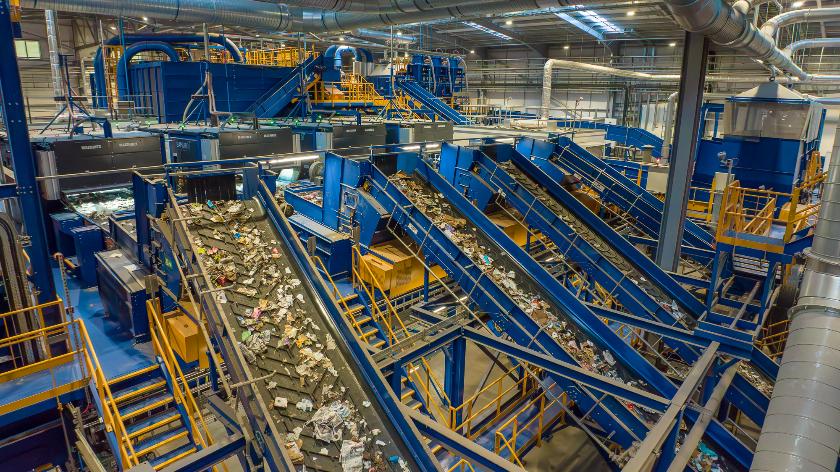During the Christmas period, there will be a change to your refuse collection dates, you can find out when your collection dates will be via our dedicated page Christmas recycling and rubbish collections.
Stratford-on-Avon District Council is committed to playing a part in circular economy by recycling as much waste as possible across our District.
Your recycling is taken to Sherbourne Recycling Ltd (Material Recycling Facility, MRF), where it is sorted using advanced technology. This includes magnets, optical sorters, AI, and robotic arms, which efficiently separate materials into clean waste streams, reducing contamination and making sure we can recycle as much as possible.

Materials are then transported to specialist reprocessing facilities where they are made into new products.
All of the recycling processed at Sherbourne stays in the U.K. to be reused.
All paper and cardboard collected from residents in Stratford-on-Avon District is sent to DS Smith Ltd.
| Material | New product |
| Paper | New paper |
| Cardboard | Corrugated/textured card (e.g.: cardboard boxes, take away packaging and wrapping). |
All glass is sent to Recresco Glass Recycling Ltd.
Glass under 12mm is turned into fine glass. Glass over 12mm is turned into new glass (e.g.: glass bottles, glass jars and ceramics).
Plastics are separated into four different categories:
| Type of plastic | Where it's sent to | New Material |
| PET natural bottle | Plastic drinking bottles | |
| HDPE plastics |
|
Plastic, mainly milk bottles |
| Plastic Bags and Wrapping | Recycle for Future | Plastic packaging, black bin bags and bags for life |
| Mixed plastics |
|
Mixed plastics (e.g.: pots, tubs, trays, bottles) |
All metal items are sent to Merlin Recycling in Dudley Port, Tipton and get turned into steel cans, scrap metal, aluminium cans and foil.
Materials that cannot be recycled and end up in your recycling bin are classed as contamination. These include textiles, wood, building materials, sanitary waste, food waste, garden waste and liquids.
Please do not put non-recyclable items into your recycling bin. Removing them is costly and they can damage the advanced machinery at the recycling centres; repairs can often cost hundreds of thousands of pounds
They are sent to:
And they are turned into Solid Recovery Fuel (SRF).
Food waste is taken to Severn Trent Green Power's anaerobic digestion plant in Coleshill where it is treated. At the plant any caddy liners will be removed. The food waste is mixed and pulped to create a thick liquid which is then pasteurised to kill any harmful bacteria.
As the food waste breaks down it produces biogas (a mixture of methane and carbon dioxide) which is extracted and fed back to the grid. Once the gas has been removed a liquid food fertiliser (known as ‘digestate') remains which can be used on local farmland. Digestate is high in valuable nutrients such as nitrogen, phosphorus and other elements required for healthy plant growth and fertile soil.